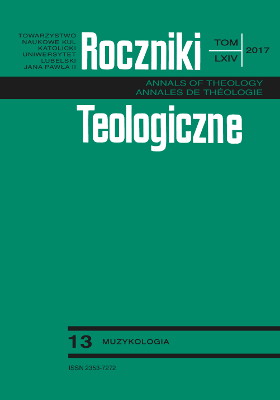Mecenat muzyczny Habsburgów na jezuickim Śląsku
The Music Patronage of the House of Habsburg in the Jesuit Silesia
Author(s): Tomasz JeżSubject(s): Christian Theology and Religion, Fine Arts / Performing Arts, Music, Theology and Religion, Pastoral Theology
Published by: Towarzystwo Naukowe KUL & Katolicki Uniwersytet Lubelski Jana Pawła II
Keywords: Jesuits; Habsburgs; Silesia; music culture; Athanasius Kircher; politics
Summary/Abstract: In the process of dissemination in Europe of the new, early-seventeenth-century Italianate style in music, an important role was played by the House of Habsburg. Its historic and cultural significance was increased by close contacts of the members of this family, ruling in many lands on our continent, with the Society of Jesus, one of the most important religious circles in this period. Long-term relationships between the secular authorities and the spiritual elites of the post-Tridentine era created a kind of social symbiosis of the highest importance for a proper understanding of the early modern culture.This phenomenon can easily be observed in areas of confessional and political confrontation, such as Silesia, which was the subject of both secular and religious reconquest. One of the weapons in this cultural war was the music performed by the students of the Jesuit boarding schools in this region and financed by the foundations established by the Habsburgs: by the successive emperors and their children, who played important political functions in the area. Both sides of this relationship regarded music as a language of social representation and a medium for the reconstructed identity of the local communities on various levels: parishes, cities, duchies, countries, the Empire and the university.The repeated efforts at music patronage, stimulated by the House of Habsburg and undertaken in the Jesuit circles, were not limited to their residences and churches. The new soundscape of this culture quickly gained dominance in the city councils, schools, streets and squares. The music performed in this context was to be first of all very pragmatic and answer the current needs, which was not favourable to its later preservation. Aware of the musical taste of Habsburg family members, one should not, however, underestimate its artistic value. The archival records that correspond to the preserved music sources from this environment seem to confirm the above claims.to its later preservation. Aware of the musical taste of Habsburg family members, one should not,
Journal: Roczniki Teologiczne
- Issue Year: 64/2017
- Issue No: 13
- Page Range: 23-43
- Page Count: 21
- Language: Polish

